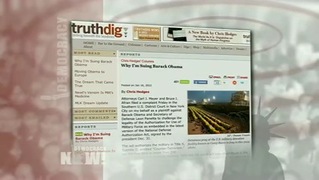
By Amy Goodman with Denis Moynihan
It takes courage to enter a war zone willingly, armed with a microphone and a camera as a journalist. That is what Al Jazeera cameraman Sami al-Hajj was doing in Dec. 2001, as he was entering Afghanistan from Pakistan to cover the U.S. military operations there. While his colleague was allowed in, al-Hajj was arrested, in what was to be a harrowing, nightmarish odyssey that lasted close to seven years, most of it spent as prisoner 345, the only journalist imprisoned at Guantánamo Bay — without charge. Al-Hajj is out now, back at work at Al-Jazeera and reunited with his family. His recollections of the horror of detention by the United States should be front and center in the forthcoming confirmation hearings for President Barack Obama’s choice the lead the CIA, John Brennan. It has been 11 years since the Guantánamo prison was opened, and four years since President Obama promised to close it within a year.
“He speaks very eloquently [about] what many hundreds of other detainees suffered, who cannot tell their story,” Baher Azmy, legal director of the Center for Constitutional Rights, told me. “The brutality he suffered in Afghanistan, the fact that he was turned over for political reasons or for a bounty, the arbitrariness of his detention in Guantanamo and the brutality of his treatment there.”
I sat down with Sami al-Hajj last month at Al-Jazeera’s headquarters in Doha, Qatar. He now heads up the network’s human rights and public liberties desk. Tall, dignified, in his flowing white robe that is standard attire for the men in Qatar, al-Hajj told me in his best English what he endured.
“They put me in Kandahar airport with the people there. We submit five months in Kandahar. And in Kandahar also they starting interrogated me, from beginning, from when I was born until they arrested me.” Shackled and hooded, he was pushed off the transport plane, when he fell and broke his kneecap. He was forced to march anyway, into a building where people were screaming. He was put in the middle of a circle of U.S. soldiers who held guns to his head.
His interrogators believed he had filmed the last known interview with Osama bin Laden. Al-Hajj told them: “I’m not the person who film[ed] Osama bin Laden, because at that time I was in Doha. And my passport says that, and my ticket with you also says that. I’m not the person. This is my job, and this is my business. If I get chance now to film Osama bin Laden, I will.” His captors acknowledged they had the wrong cameraman, and promised to release him. Instead, he remained in a U.S. prison in Kandahar for five months.
On June 13, 2002, al-Hajj was shackled, hooded and flown, he thinks with about 40 others, to Guantanamo. En route they were denied food, water and toilets, and were beaten if they tried to sleep. At Guantanamo, the interrogations continued:
“Three interrogators—one from FBI and one from CIA, one from military intelligence … and one translator. And they told me, ‘You are now in Guantanamo, and we wait until we get some decisions from Pentagon to release you. Until that time, we want you to be patient and to cooperate with our people.’”
It became clear what exactly his captors meant by “cooperate”: “They starting give me some offer to give me a U.S.A. nationality and take care about my family, if I work with them in CIA to continue my job being journalist with Al-Jazeera, just send for them some information about the link between Al-Jazeera and al-Qaida. … Of course, I refused to do that. I told them, ‘I’m journalist, and I will die as a journalist.’”
He said he was tortured repeatedly. He eventually went on a more-than-400-day hunger strike, which was met with violent, painful forced feeding. The tubes were not cleaned between prisoners, so they were covered in blood.
John Brennan was the director of the National Counterterrorism Center under George W. Bush, and was said to be President Obama’s original choice to head the CIA. Brennan withdrew from consideration for the post amidst protests, as he publicly supported the CIA’s policies of so-called enhanced interrogation techniques and extraordinary rendition. As he faces Senate confirmation hearings now to head the CIA, think about what “enhanced interrogation” and rendition really mean. Think about Sami al-Hajj.
Amy Goodman is the host of “Democracy Now!,” a daily international TV/radio news hour airing on more than 1,000 stations in North America. She is the co-author of “The Silenced Majority,” a New York Times best-seller.
© 2013 Amy Goodman












Media Options